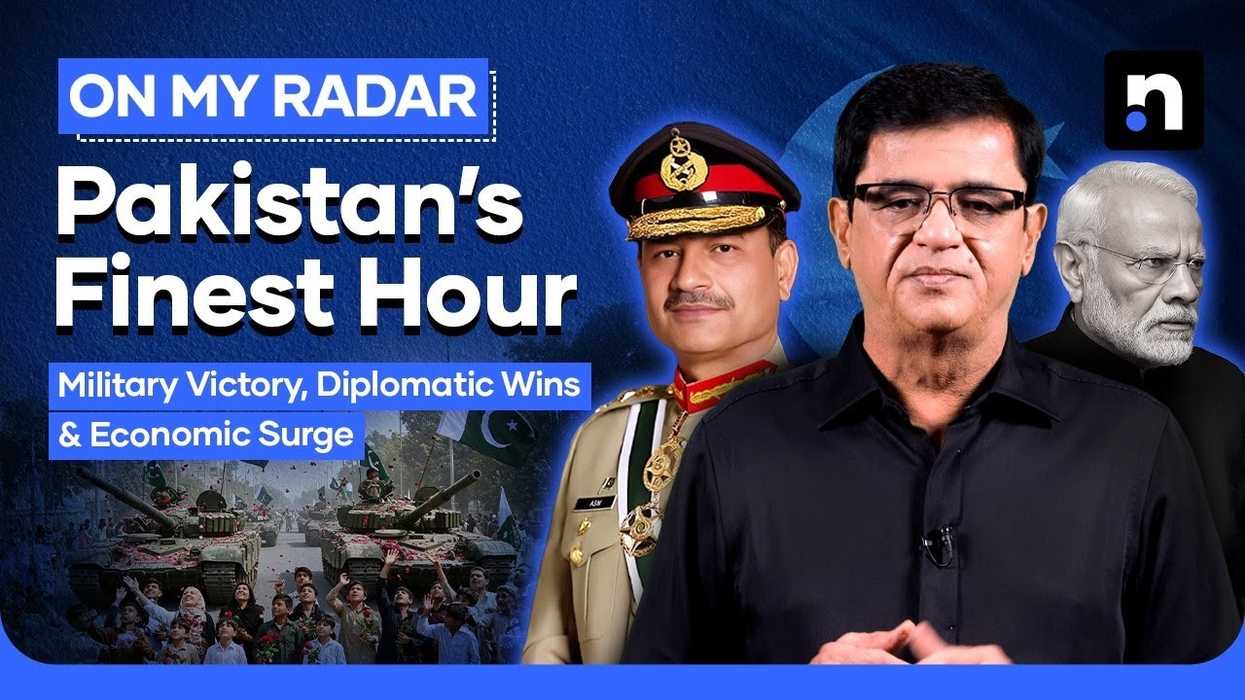Pakistan rides wave of triumph after four-day war with India
Kamran Khan says Pakistan’s unity, economic surge and military success have stunned the world
News Desk
The News Desk provides timely and factual coverage of national and international events, with an emphasis on accuracy and clarity.
Pakistan is witnessing a nationwide celebration of unity, military success and economic rebound following a brief but decisive four-day conflict with neighboring India, according to Kamran Khan.
In his vlog, Khan said the euphoria sweeping across the country is unlike anything Pakistan has experienced in recent history. “It’s a moment of glory we haven’t seen in 40 years,” he declared. “The nation is jubilant. The people are united. And Pakistan has emerged stronger on every front—military, diplomatic, and economic.”
The conflict, which remained limited to the air domain, resulted in what Khan called a “humiliating defeat” for India. He said Pakistan's air force shot down five of India’s most advanced fighter jets, including French-made Rafales, exposing the vulnerability of the much larger Indian military machine.
“Global defense experts now agree that Pakistan achieved tactical superiority,” Khan said, citing international media coverage and commentary from both Indian and foreign analysts. “This wasn’t just a symbolic win. It was a strategic and operational triumph.”
Khan credited the Pakistan Armed Forces for their preparedness and resilience, despite having a defense budget that is roughly one-tenth the size of India’s. “It was David versus Goliath,” he said. “And David won.”
But the success, according to Khan, extends far beyond the battlefield.
A surge in economic confidence
Pakistan’s stock market responded with historic gains. The benchmark KSE-100 Index opened nearly 10,000 points higher on the first day after the conflict, marking a nearly 9 percent surge. It was the largest single-day rise in the nation’s financial history.
“This kind of confidence hasn’t been seen in decades,” Khan said. “Investors are celebrating. The business community believes a new era of prestige has arrived.”
Economic indicators appear to support that sentiment. Khan said inflation has plummeted from 28 percent to 4.5 percent, while interest rates have halved. Foreign reserves have tripled, and electricity prices have dropped by at least 20 percent, offering relief to households and industries alike.
Diplomatic gains and Trump’s ‘ownership’ of Kashmir
One of the most significant outcomes of the conflict, according to Khan, has been the reemergence of the Kashmir dispute on the global agenda.
“Just weeks ago, it seemed like the world had accepted India’s unilateral revocation of Article 370,” he said. “Now, Kashmir is back in the spotlight.”
Khan said the turning point came after the deadly Pahalgam attack, which reenergized international concern. “The world is now openly saying that a negotiated settlement must be found,” he added.
President Donald Trump’s vocal stance on Kashmir was described by Khan as a “diplomatic jackpot” for Pakistan. Trump not only acknowledged the dispute but also offered to mediate, saying the conflict could no longer be ignored.
“This is historic,” Khan said. “The President of the United States has taken ownership of the Kashmir issue.”
Cyber strikes and India’s silence
Khan also revealed that Pakistan’s cyber capabilities played a critical role in the conflict. He claimed that cyberattacks led to massive power outages across 70 percent of Indian cities, including Delhi.
“India faced challenges in every domain—military, cyber, and diplomacy,” he said. “Meanwhile, Prime Minister Narendra Modi remained silent. Not a word to his nation during or after the war.”
That silence, Khan argued, speaks volumes about India’s internal turmoil and diplomatic isolation. He said that despite India’s lobbying efforts, the International Monetary Fund went ahead with disbursing a pending loan tranche to Pakistan.
“India tried everything to block it,” he said. “But when the IMF board met during the conflict, the war’s outcome had already tilted global sentiment in Pakistan’s favor.”
Unity at home and recognition abroad
Domestically, Khan emphasized a newfound sense of national unity. Political parties traditionally at odds—including Imran Khan’s PTI and rival factions—rallied behind the armed forces. “It’s the kind of national cohesion we’ve only dreamed of,” he said.
Khan praised China for its unwavering support, specifically highlighting the performance of the jointly operated J-10 fighter jets armed with PL-15 missiles, which reportedly played a decisive role in neutralizing India’s air advantage.
He also lauded Pakistan’s diplomatic transparency. After India blamed Pakistan for the Pahalgam attack, Islamabad offered to open its doors to an international probe. The gesture, endorsed by the European Union and countries like Switzerland, painted Pakistan as a responsible actor, Khan said.
Looking ahead
Despite the celebration, Khan urged policymakers to capitalize on the momentum. He called for a strategic pivot that strengthens both hard and soft power.
“This new global recognition is a gift,” he said. “Now we must turn it into sustained growth—economically, diplomatically and culturally.”
Khan ended his vlog with an appeal for continued unity and vigilance.
“We’ve achieved something extraordinary,” he said. “Let’s not squander it.”








Comments
See what people are discussing